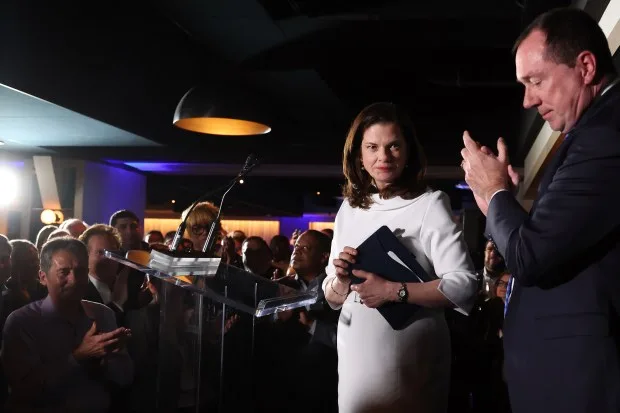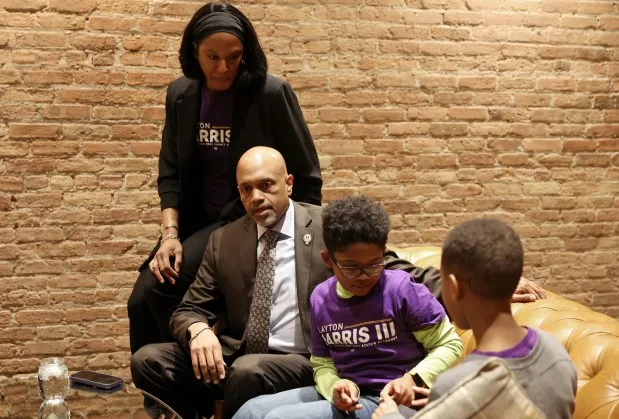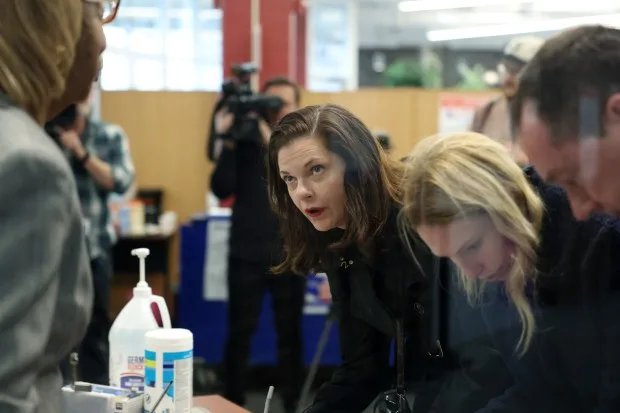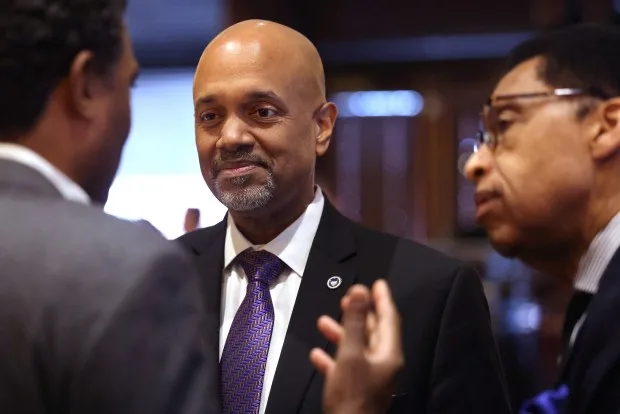Nearly eight years after Kim Foxx took office vowing to “rebuild a broken criminal justice system” as Cook County state’s attorney, the Democratic primary that will likely decide her successor was still too close to call Wednesday morning as retired Appellate Justice Eileen O’Neill Burke held a slim lead over former prosecutor and government official Clayton Harris III.
On Tuesday night as election results came in, O’Neill Burke sounded an upbeat tone but stopped short of declaring victory.
“We are cautiously optimistic, but we have to make sure all the votes are counted,” O’Neill Burke told supporters late Tuesday at her campaign party in River North. “But I know that we can agree that this has been a hard-fought campaign.”
Just minutes later, Harris greeted his backers with a similar message.
“Everybody here in Cook County, all of our communities matter,” he told the crowd of dozens at his campaign party. “So we’re going to wait and we’re going to count all the votes.”
According to unofficial results from the Cook County Clerk and Chicago Board of Elections, O’Neill Burke was leading Harris by a little less than 9,500 votes as of 8 a.m. Wednesday, with 20 precincts yet to report in Chicago and one precinct outstanding in the suburbs — and tens of thousands of mail-in ballots left to be potentially tallied.
After the polls closed, Chicago Board of Elections spokesman Max Bever said 109,975 mail-in ballots remained outstanding. All of those will not be returned, some will not be Democratic primary ballots and those that are Democratic ballots may not have votes cast in the state’s attorneys race. Bever expects most of the mail-in ballots to come back by Friday, though the results won’t be official for weeks.
Cook County Board President Toni Preckwinkle, who also heads the county’s Democratic Party that backed Harris, said late Tuesday that she is hopeful votes “will swing his way,” claiming votes yet to be counted are in precincts that are likely to be strong for Harris and that mail-in ballots could end up being the deciding factor.
“There’s a lot at stake in this race,” she said.
City election numbers Wednesday morning showed Harris with a 51% to 49% lead over O’Neill Burke — about 6,000 votes — while Cook County suburban numbers showed Burke had amassed about 15,500 more votes in the suburbs as she lead there 54% to 46%.
Here’s how the vote share broke down across Chicago’s 50 wards.
Search by ward or hover over the map to see which candidate won each region of Chicago and their respective vote share.
O’Neill Burke’s tight lead followed Foxx’s two terms in which she helped lead the national prosecutorial reform movement and was praised by some for revamping the office’s procedures on alleged police misconduct and wrongful convictions but was frequently hammered by critics for being too soft on defendants. Throughout the evening, Harris began picking up Chicago voters.
The race for the county’s next top prosecutor was in many ways a referendum on Foxx, a Preckwinkle protégé who rode into office on a wave of discontent following Laquan McDonald’s murder by a Chicago police officer.
Harris — who was endorsed by Preckwinkle and by Foxx herself in the closing days of the primary — ran on a “safety and justice” campaign that touched on both the need to charge forward on a reform agenda while also stressing that the state’s attorney’s main job is to prosecute criminals and keep the county safe. O’Neill Burke pushed harder on a tougher-on-crime approach in which she touted her decades of court experience as a prosecutor and a judge and argued the most effective way to “change criminal behavior is by enforcing the law.”
The intraparty fight came to represent a struggle that exists within the Democratic Party as a whole as progressives have pushed harder to reform government systems they believe are fundamentally flawed while less-progressive Democrats fear those reforms might go too far, too fast.
Tuesday’s winner will have a major advantage in the November general election in heavily Democratic Cook County. The Democratic nominee will face former Chicago alderman and attorney Bob Fioretti, who ran for state’s attorney previously as a Democrat but this year is running as a Republican, and Libertarian Andrew Charles Kopinski. Cook County has not elected a Republican to the office since 1992.
During the campaign, Harris leaned on his own experience as a Black man raising a family on the city’s South Side, as well as his management skills from years in government, lobbying, and as an instructor on race and policing at the University of Chicago.
On the trail, he described a dual fear of gun and gang violence but also being profiled by police and told voters he would bring that insight and balance to the office. Over the weekend while campaigning, he told campaign volunteers that the state’s attorney could prosecute violent criminals without unilaterally “rounding up Black and brown bodies.”
The next state’s attorney, he said, had to change the perception of how aggressively the office has and will prosecute cases so “that people know that we take crime seriously, that we’re not living in a lawless society.”
But O’Neill Burke leaned on a theme of prosecuting the county’s most dangerous defendants much more forcefully. She pledged that those arrested with an assault weapon or accused of threatening anyone with a weapon or involved in violent crime would be held without bond “each and every time,” while also underscoring that she had more experience in the criminal justice system than her opponent.

“I know how the justice system works,” she told the Chicago Tribune Editorial Board in February. “Mr. Harris is a lovely man, but he hasn’t been in a courtroom for 30 years.”
Illinois Comptroller Susana Mendoza, who endorsed O’Neill Burke, said at her campaign party, “when it comes to people doing carjackings that go with zero accountability or gun violence with zero accountability, I want that to stop.”
At Harris’ election night gathering, state Sen. Robert Peters described the candidate as energetic, collaborative and “almost too smart” and said Harris would take a targeted approach to tackling crime, not a “broad brush” that could send Chicago back to failed tough-on-crime policies of past decades.
Big fundraising advantage
Though Harris had the backing of the Cook County Democratic Party and the Chicago Teachers’ Union, O’Neill Burke had support from other unions, some top local lawyers and arrived on Election Day with a significantly sizable fundraising advantage over Harris. She reported raising nearly $3 million since the start of the year, more than three times what Harris raised during the same period.
With the help of her husband, Ice Miller attorney John Burke, O’Neill broke the campaign fundraising caps, which allowed unlimited contributions to flow into both campaigns in the race’s final weeks.
Several wealthy Chicagoans — including a group who gave to a mix of more centrist Democrats as well as conservative Republicans — made six-figure donations to O’Neill Burke. She was able to fund an aggressive mail and TV campaign to paint Harris as anti-union and having ties to those opposed to abortion rights, charges he denied.
Along the way, she garnered endorsements from the Chicagoland Chamber of Commerce and the controversial, conservative head of the Chicago Fraternal Order of Police Lodge 7, John Catanzara. He encouraged union members to “hold their noses” and pull Democratic primary ballots to support her. O’Neill Burke rejected the endorsement as professionally improper given the close working relationship between the office and the Chicago Police Department. Amid criticism about her donors, she emphasized that she was a lifelong Democrat.

But Harris and supporters seized on the contributions and Catanzara’s support as a signal she would be “beholden” to extreme interests and would undo reforms made during Foxx’s time as state’s attorney.
Along with attacks that O’Neill Burke was a “Democrat in Name Only,” Harris allies painted her handling of a prosecution of a Black child in the early 1990s as a signal she represented a return to the days when the office prioritized securing convictions over delivering justice.
That case involved an 11-year-old Black boy who confessed to the brutal murder of his elderly neighbor. During the boy’s 1994 trial, O’Neill Burke, then a young assistant state’s attorney, led the questioning of the boy identified in court records only by the initials “A.M.” because he was a juvenile. While there was no physical evidence linking A.M. to the crime and details of his admission did not match up with evidence at the scene, the conviction was affirmed by a juvenile judge and higher appellate courts. Eight years later, it was thrown out by a federal judge who said the boy’s confession to police was coerced.
O’Neill Burke has said she would “never prosecute any case if I doubted the evidence or there were ‘red flags.’ That was true then, and it is true now.”
Both candidates support state legislation to require anyone under 18 who is questioned by police to have an attorney present as well as additional supports for youth to prevent crime and repeat offenses.
But earlier this week Foxx in an interview with the Tribune said O’Neill Burke’s response to the case reemerging — including recent comments in which O’Neill Burke said she believed the boy “had something to do with it” — were a reflection that she had failed to fully grapple with the county’s history of wrongful convictions.
“When we don’t have ability — with all the info available to us — to acknowledge when we’ve done something wrong, I don’t believe that’s an administration that will try to right the wrongs of the past,” Foxx said. O’Neill Burke could not “even acknowledge harms that have happened in the past. That’s one of my biggest concerns.”
Northwest Side native

A native of the city’s Northwest Side who grew up in a family of police officers, O’Neill Burke’s legal career began with a decade in the state’s attorney’s office, starting in 1991. She worked on juvenile cases, appeals and felony review. From there, she worked in criminal defense until 2008, when she won a position as a Cook County judge handling both criminal and civil cases. She moved up to the state’s 1st District Appellate Court in 2016, where she remained until she retired in July 2023 and later announced her intent to run for state’s attorney.
She stepped down, she has told voters, “because our justice system is not working right now.”
While she has criticized Foxx’s management of the office throughout the campaign, those attacks picked up in the final weeks heading into the primary. Reproach of Foxx’s management, her handling of morale issues among assistant state’s attorneys and decreased staffing levels accelerated to describing Foxx’s working relationship with police as nonexistent, her office as “woefully mismanaged,” and accusations that Foxx did not “believe in accountability.”
In a bid to stem attrition, O’Neill Burke promoted creating a felony prosecution bureau for hard-charging trial attorneys and a separate restorative justice bureau for juvenile, drug and mental-health related cases to get “people back on track” and capture lawyers seeking careers in public interest law. An education and ethics unit with retired judges also would provide ongoing training.
Although O’Neill Burke said she supported the SAFE-T Act that became law last year and eliminated cash bail, she pledged to do away with the office’s policy to only pursue retail thefts as felonies when the value of stolen goods exceeded $1,000, up from the state threshold of $300. Foxx launched the policy as one of many ways her office would move away from harsh prosecution of low-level crimes, noting neighboring states like Wisconsin, Michigan and Indiana all had higher thresholds.
Business interests, however, thought that policy drove an increase in thefts during the pandemic. The number of incidents of theft this year remains high compared with 2020, 2021 and 2022, according to Chicago Police Department data. To respond to gun violence and a rise in carjackings, O’Neill Burke also said she would request detention for anyone charged with armed robbery, carjacking, or violent crimes on the CTA. The threat of prosecutions, she argued, would deter criminals from acting in the first place.
“The deterrence for crime is not the severity of punishment. It’s the certainty of a consequence,” she told the Tribune in November.
From military brat to prosecutor

A military brat who studied aerospace technology and law in pursuit of a dream job in space law, Harris instead worked an internship at the Cook County state’s attorney’s office while earning his law degree at Howard University. He became an assistant state’s attorney in 1999, working in criminal appeals, traffic and narcotics special prosecutions.
He left the office for the same reason he came back to run it: “It was taxing to just see Black men coming through the system constantly. Period. Just Black men,” he told the Tribune in November.
He left after less than four years, joining Mayor Richard M. Daley’s office in 2003, where he worked to tighten state assault weapons and criminal sexual assault laws before becoming general counsel at the Chicago Department of Transportation, then chief of staff at the Illinois Department of Transportation. He was deputy chief of staff for infrastructure in Gov. Rod Blagojevich’s administration when Blagojevich was arrested and charged with political corruption in December 2008. Blagojevich’s chief of staff was also arrested at that time and Harris assumed the role of chief of staff, though he has said repeatedly that he was not a political supporter of the governor.
He held posts in the private sector and the Illinois International Port District, also lecturing on race and policing at the University of Chicago. O’Neill Burke seized on that private sector work — especially his role as a lobbyist at Lyft — as evidence he was anti-union. The company was pushing against classifying workers as employees and others tried to unionize. She also pointed to contributions Lyft made to Republicans — including anti-abortion proponents — as evidence Harris was not a defender of abortion rights. Harris denied both accusations.
Harris said he would continue Foxx-era programs to divert first-time and nonviolent offenders, and also keep community courts. But he also said he would seek to regularly highlight special prosecutions and the office’s work to protect victims. Harris said he would keep Foxx’s retail theft threshold in place but pledged to aggressively pursue thefts or robberies involving personal assaults or break-ins.
Harris said he would also add a special prosecutions division “that focuses directly on organized crime,” including carjackings and gun offenses. To address juvenile crimes, Harris said he would work “to cut off the heads of the people that are directing these children to do that.”
Other races
Cook County voters also fanned out to the polls Tuesday to decide the race for Circuit Court Clerk, Board of Review, and, on the West Side and some western suburbs, to fill the seat on the Cook County Board vacated by Brandon Johnson when he was elected Chicago’s mayor.
Incumbent Circuit Court Clerk Iris Martinez, meanwhile, lost her bid for a second term to Water Reclamation District Commissioner Mariyana Spyropoulos, according to the Associated Press. Martinez and Preckwinkle have had a terse relationship going back years and the county Democratic Party backed Spyropoulos, who largely self-funded her campaign.
In the normally low-key race for the board that hears property tax appeals, 20-year incumbent commissioner Larry Rogers led upstart challenger Larecia Tucker. Her bid received a boost thanks to more than $750,000 in campaign contributions from Assessor Fritz Kaegi.
For Johnson’s old seat, his mentor and CTU leader Tara Stamps was declared the winner by the AP against Zerlina Smith-Members.

